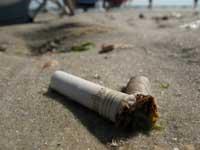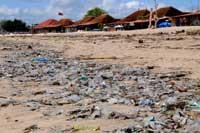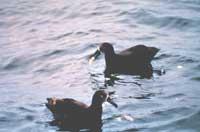Plastic and butts, kings of the oceans

This was announced by the United Nations Environment Programme on International Oceans Day, analyzing the world's 12 largest marine areas. According to the study, cigarettes in the Mediterranean Sea occupy 40 percent of total waste.
Cigars and their remains are not, however, the biggest problem presented by the seas and oceans. The top spot on the most abundant waste list is certainly for plastics. Specifically, in the marine areas analyzed, 80 percent of the waste was plastic waste, mainly plastic bags and bottles. It is estimated that for every square kilometer of ocean there is an average of 13,000 plastic particles, some on the water and others on the bottom.
In such high quantities, it is not surprising that the damage they cause is very high. The greatest damage is undoubtedly suffered by marine living beings. Marine mammals, birds and fish mix plastic with food and eat it. This causes, on the one hand, feeding problems as they starve with stomachs full of plastic. On the other hand, it also influences the health of animals, due to the large amount of toxic substances that adhere to plastics and their introduction into animal bodies when eating.

But they don't just affect the environment. Every year millions of dollars are lost at the expense of plastics: to clean the beaches full of waste are wasted funds; fishermen collect in the nets a lot of waste along with fish; etc.
Possible problem
It is regrettable to think that they are all avoidable problems. The director of the United Nations Environment Programme, Achim Steiner, said that ocean litter has become a big problem by not being able to properly manage the resources offered by the ocean. However, he points out that the problem could be solved gradually by promoting initiatives of reduction, management and recycling of waste.

Steiner proposes a complete measure, such as banning plastic bags worldwide. Consider that there is no reason to continue making plastic bags. To reduce the rest of the garbage, it considers that promotion measures such as cash payment or the implementation of certain market initiatives could be adopted.
When problems acquire that dimension, it seems that citizens, individually, can do little to solve them. But we must not forget that we have all contributed little by little to increasing the problem. Tourism, for example, does a lot of damage to the Mediterranean coast: more than 75 percent of the annual garbage is generated in summer, when there are more tourists.
The beach season has started recently and now is when we will go more to the beach and in general to the sea areas. The greatest danger to continue increasing the amount of ocean litter is now. To see if we value our responsibility and act accordingly.
Published in Ortzadar
Buletina
Bidali zure helbide elektronikoa eta jaso asteroko buletina zure sarrera-ontzian








